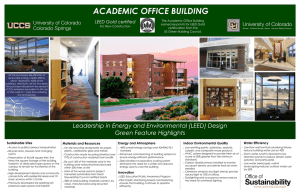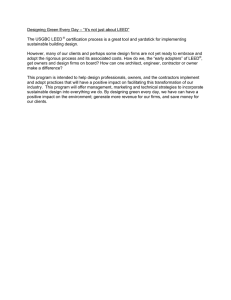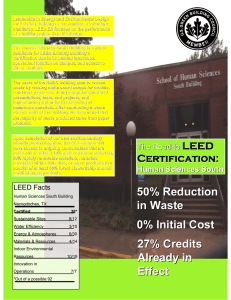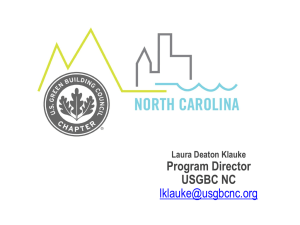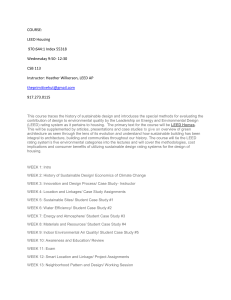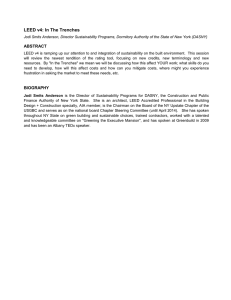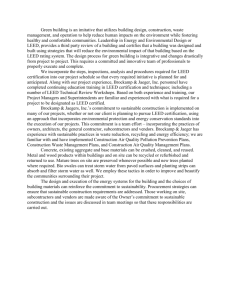LEED Sell Sheet Updated: 6/13 ®
advertisement
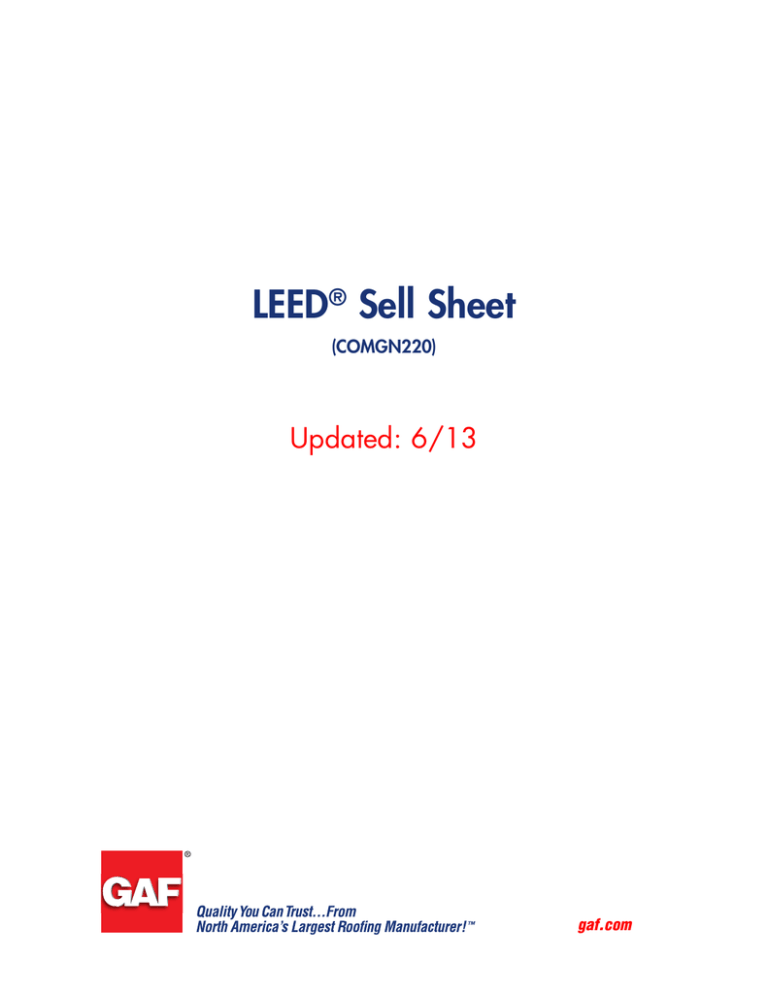
LEED® Sell Sheet (COMGN220) Updated: 6/13 gaf.com t bou a rn Lea gy LEED ® r e n E Leadership in Energy and Environmental Design LEED (Leadership in Energy and Environmental Design) ® Green Building Rating System™ is a voluntary, consensus-based national standard for developing high-performance, energy-efficient sustainable buildings. The U.S. Green Building Council (USGBC) developed the LEED® Green Building Rating System™ and continues to contribute to its evolution. The USGBC is the nation’s foremost coalition of leaders from across the building industry working to promote high-performance buildings that are environmentally responsible, profitable, and healthy places to live and work. LEED® certification is awarded when a project achieves one of four point levels based on credits available for the given project. The LEED®­ family of rating systems include: • LEED® for New Construction and Major Renovations • LEED® for Existing Buildings: Operations and Maintenance • LEED® for Commercial Interiors • LEED® for Core and Shell • LEED® for Schools, Healthcare, and Retail • LEED® for Homes • LEED® for Neighborhood Development The certification level is based on points achieved through aspects of the design build process. Point levels range depending on the family rating system. For example, LEED® for New Construction and Major Renovations, Version 3.0 (2009), breaks out the point system as follows: • Certified: 40– 49 points • Silver: 50–59 points • Gold: 60–79 points • Platinum: 80 points + Be sure to understand the family rating system and certification level that your project requires. gaf.com LEED ® Leadership in Energy and Environmental Design The chart below lists LEED® Credits commonly available with GAF low-slope roofing products. For more information, please visit GAF’s ecoScorecard website at www.gaf.ecoscorecard.com. Also see the LEED® Playbook on Green Roof Central at www.gaf.com. Products That May Qualify Limit disruption of natural water hydrology • GardenScapes™ by reducing impervious cover, increasing Roofing Systems on-site infiltration, reducing or eliminating pollution from storm water run off, and eliminating contaminants. Other Important Information See www.usgbc.org for complete credit requirements Credit Available Points SS Credit 6.1 Stormwater Design: Quantity Control 1 Point SS Credit 7.2 Heat Island Effect 1 Point Reduce heat islands (thermal gradient differences between developed and undeveloped areas) to minimize impact on microclimate and human and wildlife habitat. • E nergyCap™ MB and BUR Cap Sheets • EverGuard® TPO • T OPCOAT® Elastomeric Coatings • GardenScapes™ Roofing Systems 3 Options • 7 5% of the roof area must have an SRI of 78 (lowslope) or 29 (steep-slope) •A vegetated roof must be installed on at least 50% of the roof area • Install a combination of a high albedo and vegetated roof MR Credit 3 Material Reuse 1 Point Each • 5% • One additional point (10%) Increase demand for building products that incorporate recycled materials, thereby reducing impacts resulting from extraction and processing of virgin materials. • Reuse insulation products • E xisting roof membrane may function as a vapor retarder • Salvage ballast See www.usgbc.org for complete credit requirements MR Credit 4 Recycled Content (Post Consumer & 1 /2 Pre-Consumer) 1 Point Each • 10% • One additional point (20%) Increase demand for building products that incorporate recycled content materials, thereby reducing impacts from extraction and processing. •R uberoid® APP and Ruberoid® SBS* • EnergyGuard® Polyiso, Composite and Perlite Insulations See www.usgbc.org for complete credit requirements MR Credit 5 Regional Materials 1 Point Each • 10% • One additional point (20%) Increase demand for products that have been extracted or harvested or recovered, as well as manufactured within 500 miles of the project site for a minimum of 10% (based on cost) of the total materials value. If only a fraction of the product or material is extracted/harvested/recovered and manufactured locally, then only that percentage by weight shall contribute to the regional value. Sourcing location will not be determined until time of shipment and is subject to change. See map for manufacturing locations. See www.usgbc.org for complete credit requirements Reduce the quantity of indoor and outdoor air contaminants that are odorous, irritating, and/or harmful to the comfort and well-being of installers and occupants. • EverGuard® TPO Adhesives Adhesives, Sealants, and • Matrix™ Coatings Sealant Primers must • T OPCOAT® Products comply with South Coast Air Quality Management District (SCAQMD) Rule #1168. 10% or 20% Extracted, Processed and Manufactured Regionally IEQ 4.1 Low-Emitting 1 Point Each Materials: Adhesives & Sealants IEQ 4.2 Low-Emitting Materials: Paints & Coatings Intent INSULATION Statesboro, GA Gainesville, TX (Coming Soon!) TPO Mt. Vernon, IN Gainesville, TX Modified Bitumen Mt Vernon, IN Savannah, GA Stockton, CA BUR Products Fontana, CA Mobile, AL Savannah, GA Elastomeric Coatings Walpole, MA La Mirada, CA The LEED® program is growing and developing. For specific plant or product information, please contact Technical Services at 1-800-766-3411 or visit www.gaf.com. ©2013 GAF 6/13 •#595 *Not all Ruberoid SBS products contain recycled material. Contact Technical Services at 1-800-766-3411 for product information. COMGN220
